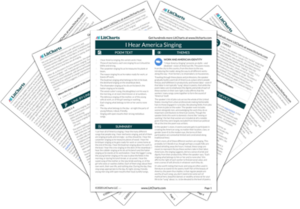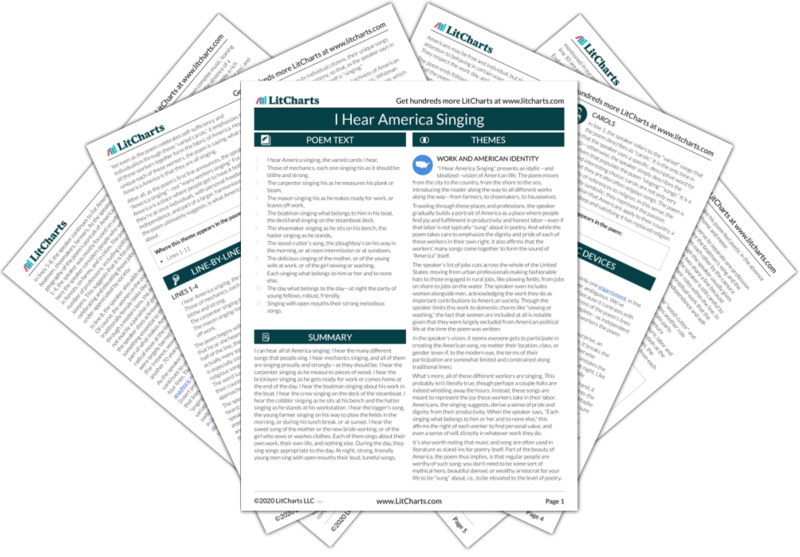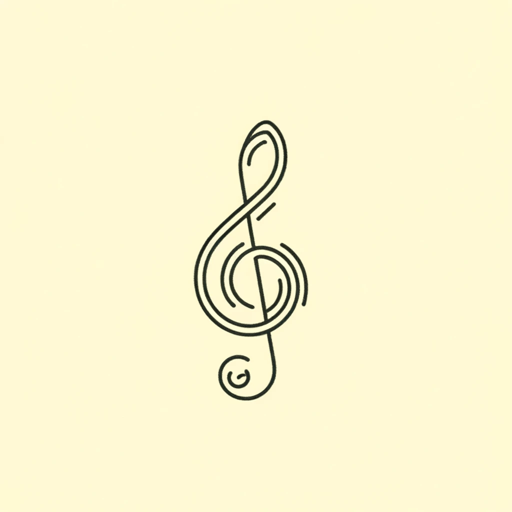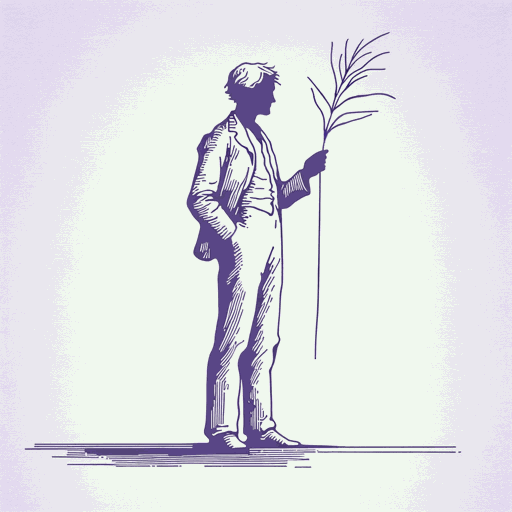

I Hear America Singing Summary & Analysis by Walt Whitman
- Line-by-Line Explanation & Analysis
- Poetic Devices
- Vocabulary & References
- Form, Meter, & Rhyme Scheme
- Line-by-Line Explanations

"I Hear America Singing" is a poem by the American poet Walt Whitman, first published in the 1860 edition of his book Leaves of Grass. Though the poem was written on the eve of the Civil War, it presents a vision of America as a harmonious community. Moving from the city to the country, and the land to the sea, the poem envisions America as a place where people do honest, meaningful, and satisfying work—and celebrate that work in song. America emerges from the work of these many and diverse individual people: their separate work comes together to form a coherent whole. In this way, in the poem's account, America is a nation where individuality and unity are balanced, each producing and reinforcing the other.
- Read the full text of “I Hear America Singing”

The Full Text of “I Hear America Singing”
1 I hear America singing, the varied carols I hear,
2 Those of mechanics, each one singing his as it should be blithe and strong,
3 The carpenter singing his as he measures his plank or beam,
4 The mason singing his as he makes ready for work, or leaves off work,
5 The boatman singing what belongs to him in his boat, the deckhand singing on the steamboat deck,
6 The shoemaker singing as he sits on his bench, the hatter singing as he stands,
7 The wood-cutter’s song, the ploughboy’s on his way in the morning, or at noon intermission or at sundown,
8 The delicious singing of the mother, or of the young wife at work, or of the girl sewing or washing,
9 Each singing what belongs to him or her and to none else,
10 The day what belongs to the day—at night the party of young fellows, robust, friendly,
11 Singing with open mouths their strong melodious songs.
“I Hear America Singing” Summary
“i hear america singing” themes.

Work and American Identity
- See where this theme is active in the poem.
Line-by-Line Explanation & Analysis of “I Hear America Singing”
I hear America singing, the varied carols I hear, Those of mechanics, each one singing his as it should be blithe and strong, The carpenter singing his as he measures his plank or beam, The mason singing his as he makes ready for work, or leaves off work,

The boatman singing what belongs to him in his boat, the deckhand singing on the steamboat deck, The shoemaker singing as he sits on his bench, the hatter singing as he stands, The wood-cutter’s song, the ploughboy’s on his way in the morning, or at noon intermission or at sundown, The delicious singing of the mother, or of the young wife at work, or of the girl sewing or washing,
Each singing what belongs to him or her and to none else, The day what belongs to the day—at night the party of young fellows, robust, friendly, Singing with open mouths their strong melodious songs.
“I Hear America Singing” Symbols

- See where this symbol appears in the poem.

“I Hear America Singing” Poetic Devices & Figurative Language
- See where this poetic device appears in the poem.
End-Stopped Line
Alliteration, parallelism, “i hear america singing” vocabulary.
Select any word below to get its definition in the context of the poem. The words are listed in the order in which they appear in the poem.
- Intermission
- See where this vocabulary word appears in the poem.
Form, Meter, & Rhyme Scheme of “I Hear America Singing”
Rhyme scheme, “i hear america singing” speaker, “i hear america singing” setting, literary and historical context of “i hear america singing”, more “i hear america singing” resources, external resources.
"I Hear America Singing" Read Aloud — A photostory and reading of the poem.
What Is Free Verse? — A detailed history of free verse, from the Academy of American Poets.
1860 Version of "I Hear America Singing" — Images and text of the first printing of "I Hear America Singing" in the 1860 edition of Leaves of Grass, where it appears as "Chants Democratic and Native American #20." Because Whitman regularly revised his work—even published poems—it is different in important ways from the version most people study today.
Walt Whitman's Biography — A detailed biography of Whitman from the Poetry Foundation.
Why Walt Whitman Called America the "Greatest Poem" — An article from the Atlantic Magazine about Whitman's views of American democracy.
"The Poet" by Ralph Waldo Emerson — The complete text of Ralph Waldo Emerson's "The Poet"—a key inspiration for Whitman.
LitCharts on Other Poems by Walt Whitman
A March in the Ranks Hard-Prest, and the Road Unknown
A Noiseless Patient Spider
Beat! Beat! Drums!
Crossing Brooklyn Ferry
I Sing the Body Electric
O Captain! My Captain!
O Me! O Life!
One's-Self I Sing
The Voice of the Rain
When I Heard the Learn’d Astronomer
When Lilacs Last in the Dooryard Bloom’d
Ask LitCharts AI: The answer to your questions

“I Hear America Singing” by Whitman Essay
Walt Whitman’s legacy is one of the sources that gave impetus to developing artistic literacy in American poetry. His innovative style opened up the possibilities of the poetic word in English. However, the national identity itself constructed in his poems seems no less valuable. His imagery and poetic worldview are probably why his heritage looks so important to all American cultures (Ahamed, 2021). For clear examples of the poet’s relations with their homeland, one should consider the poem “I Hear America Singing.” It is evident from the poem that his poetic virtues find their inspiration and nourishment on American soil.
Whitman values human labor in close connection with the environment as an American national value. In this seminal poem, Whitman perceives the native land at a deep level of human unity with nature and, at the same time, mastering it, working within the spirit. “I hear America singing” depicts a land of harmony and boundless self-realization, and these settings form the memorable song-like narrative of this poem, organizing its plot.
The composition and structure are centered around stereotypical representatives of the American people, the workforce. The poet hears the voices of Americans singing, and their songs are individual and, at the same time, consonant with their vocation and craft: “The boatman singing what belongs to him in his boat, the deckhand singing on the steamboat deck” (Whitman, 1860). The poet does not give detailed artistic coloring for each song, but the reader can draw a few clues from this. First, it can be one single song of pride and celebration of labor, sung by each separately and together. Second, it can be concluded that these “songs” are the sounds of human production.
In addition to feeling a deep connection between man and nature, Walt Whitman could not help but feel the delight of the industrial revolution taking place before his eyes. The continuous and constant employment of a person with work and devotion to his vocation could be interpreted by him as a song in itself. The song is a manifestation of harmony, and in the noise of life around the world, Whitman hears the most accurate music. Finally, it is noteworthy that the song sung by the women in the poem is somewhat different. Whitman emphasizes the lines about women’s labor in italics as if implying the delicacy with which they should be voiced: “The delicious singing of the mother, or of the young wife at work, or of the girl sewing or washing” (Whitman, 1860).
The development of an unknown land, the realization of it as one’s own, and its cultivation lie at the heart of the American spirit, which is expressed through the symbolism of the song in Whitman’s poem. Each line of the poem shows a different facet of American life, touching day and night and showing time’s cyclical flow. Whitman creates a triumphant sense of utopia, where everyone is in complete self-sufficiency since their song belongs only to themselves. In this way, Whitman creates an idealized image of a working America, as strong and energetic as it is joyous.
Each of the poem’s heroes sings what belongs to him. Therefore, Whitman’s ideal is that everyone finds joy in their place. The imagery of the poem is highly idealized, but it demonstrates the bright and progressive aspirations of the poet, full of faith in the present and future of his country.
Harmony in the songs of the poem heroes implies the existence of harmony between them in society. The accord creates the feeling of working together for the good of society, but it also gives the reader the feel of a single and choral harmonious song of triumph. Thus, the land under development in the context of the takeoff of progress sets the theme and intonation of this extremely optimistic poem. The setting is a hardworking, romantic country, which determines the joyful and sublime mood of the poem. These elements dictate the narrative, expressed in one sentence, solemnly lasting like an actual song.
Ahamed, M. F. (2021). Poems of Whitman: A complete reflection of American consciousness. Turkish Journal of Computer and Mathematics Education, 12 (12), pp. 3929-2935.
Whitman, W. (1860). I hear America Singing . Web.
- Chicago (A-D)
- Chicago (N-B)
IvyPanda. (2022, October 30). “I Hear America Singing” by Whitman. https://ivypanda.com/essays/i-hear-america-singing-by-whitman/
"“I Hear America Singing” by Whitman." IvyPanda , 30 Oct. 2022, ivypanda.com/essays/i-hear-america-singing-by-whitman/.
IvyPanda . (2022) '“I Hear America Singing” by Whitman'. 30 October.
IvyPanda . 2022. "“I Hear America Singing” by Whitman." October 30, 2022. https://ivypanda.com/essays/i-hear-america-singing-by-whitman/.
1. IvyPanda . "“I Hear America Singing” by Whitman." October 30, 2022. https://ivypanda.com/essays/i-hear-america-singing-by-whitman/.
Bibliography
IvyPanda . "“I Hear America Singing” by Whitman." October 30, 2022. https://ivypanda.com/essays/i-hear-america-singing-by-whitman/.
- Walt Whitman and His Poetry
- The Leaves of Grass: Walt Whitman's Poems
- Walt Whitman’s ‘I Sing the Body Electrica’ Poem
- "The Poem of Beowulf" in the Anglo-Saxon Culture
- Literary Tools Used in “Because I Could Not Stop for Death”
- Theme of Motherhood in Poem “Daystar”
- The Poem "Heritage" by Countie Cullen
- The "Beowulf" Anglo-Saxony Epic Poem
I Hear America Singing
by Walt Whitman
I hear America singing, the varied carols I hear, Those of mechanics, each one singing his as it should be blithe and strong, The carpenter singing his as he measures his plank or beam, The mason singing his as he makes ready for work, or leaves off work, The boatman singing what belongs to him in his boat, the deckhand singing on the steamboat deck, The shoemaker singing as he sits on his bench, the hatter singing as he stands, The wood-cutter’s song, the ploughboy’s on his way in the morning, or at noon intermission or at sundown, The delicious singing of the mother , or of the young wife at work, or of the girl sewing or washing, Each singing what belongs to him or her and to none else, The day what belongs to the day—at night the party of young fellows, robust, friendly, Singing with open mouths their strong melodious songs.
Meanings of I Hear America Singing
The poem “I Hear America Singing” shows Whitman’s patriotism. The poem revolves around the main ideas of patriotism, love for America, and love for Americans, with the minor themes of unity and faith.
Meanings of Lines 1-4
I hear America singing, the varied carols I hear, Those of mechanics, each one singing his as it should be blithe and strong, The carpenter singing his as he measures his plank or beam, The mason singing his as he makes ready for work, or leaves off work,
The first person speaker , who happens to be Walt Whitman himself, states that he hears America singing through multiple litanies . However, these litanies include the song of mechanics, carpenters, and masons that they sing through their work, such as mechanics when they are happy and strong and carpenter when he is working with their planks or mason when he is ready for work or away from work. In fact, Whitman means that every common person is an American, and if they are happy and singing, then the whole of America is happy and singing. This is the subtopic of unity couched in patriotism.
Meanings of Lines 5-7
The boatman singing what belongs to him in his boat, the deckhand singing on the steamboat deck, The shoemaker singing as he sits on his bench, the hatter singing as he stands, The wood-cutter’s song, the ploughboy’s on his way in the morning, or at noon intermission or at sundown,
Walt Whitman further states that boatmen, shoemakers, and wood-cutters are also singing and showing that America is happy. He states that the boatman is singing because he is happy with his boat docked somewhere on the deck of that steamboat and happy with his lot. Similarly, he states that the shoemaker is also happy when sitting on his bench or standing near it. Even a woodcutter, who happens to be a playboy, is also happy whether he is going somewhere in the morning, returning, or taking a nap at noon. All these voices join a single voice which is America. It means that if all common professionals are happy with their lot in America, they sing and make America resound. These verses add further to the main idea of patriotism and the happiness associated with it.
Meanings of Lines 8-11
The delicious singing of the mother, or of the young wife at work, or of the girl sewing or washing, Each singing what belongs to him or her and to none else, The day what belongs to the day—at night the party of young fellows, robust, friendly, Singing with open mouths their strong melodious songs.
Whitman recounts the happiness of several other people, including the mother, young wife, or the girl who are engaged in their respective works. He concludes that if every one of them is singing about their work, possessions, and things, it means they are not singing for anything else. Even if it is their day and they are paying tribute to it by singing and others such as young people singing melodies at night at parties with their mouths wide open, it means America is happy as all others in it are happy. These verses further add to the main idea of patriotism, freedom, and happiness. It also completes the main idea of unity as all voices merge into a single voice which is America.
Summary of I Hear America Singing
- Popularity of “I Hear America Singing ”: This poem is written by Walt Whitman, a renowned American poet, essayist, and journalist. I Hear America Singing is one of the best-known poems about liberation. It was first published in 1860 in Leave of Grass . The poem speaks about the happiness of people belonging to various professions. It illustrates how America offers them a place to live freely. More importantly, the poem is written to acknowledge the work of common people to bring the dignity of labor. The poem shows individuality in the community as they live together while working in their fields.
- “I Hear America Singing” As a Representative of Joy: This poem is written to express the importance of every type of jobs. Also, the poet praises the American working class and acknowledges their significant role in American society. He talks about the carpenters, woodcutters, masons, boatmen, and mechanics. He elaborates on how they enjoy their work and play a pivotal role in the progress of the country. Even mothers, young wives, and girls express their joy as they also sing while performing their duties. Thus, every person is contributing individually to make America a happy place.
- Major Themes in “I Hear America Singing”: Freedom, growth, and dignity are the major themes of this poem. The poem speaks about the freedom people enjoy in America. Throughout the poem, everyone has their own song, which means everyone is important. Every working people contribute to the growth of America or any country they live in.
Analysis of Literary Devices Used in I Hear America Singing
literary devices are tools used by writers to convey their emotions, ideas, and themes to make texts more appealing to the reader. Walt Whitman also used some literary devices in this poem to bring depth in her text. The analysis of some of the literary devices used in this poem is given below.
- Assonance : Assonance is the repetition of vowel sounds in the same line such as the sound of /i/ in “The carpenter singing his as he measures his plank or beam”.
- Consonance : Consonance is the repetition of consonant sounds in the same line such as the sound of /s/ in “The carpenter singing his as he measures his plank or beam”.
- Alliteration : Alliteration is the repetition of consonant sounds in the same line in quick succession such as the sound of /h/ in “Each singing what belongs to him or her and to none else”.
- Imagery : Imagery is used to make readers perceive things involving their five senses. The entire poem is imagery because it describes the activity of each working men and women. The reader can visualize each profession while reading.
- Personification : Personification is to give human qualities to inanimate objects . For example, “I hear America singing, the varied carols I hear.” America is personified as if it can sing like a human.
- Symbolism : Symbolism is using symbols to signify ideas and qualities, giving them symbolic meanings that are different from the literal meanings. Here, “Singing” symbolizes oneness, dignity, and freedom.
Analysis of Poetic Devices Used in I Hear America Singing
Poetic and literary devices are the same, but a few are used only in poetry. Here is the analysis of some of the poetic devices used in this poem.
- Stanza : A stanza is a poetic form of some lines. The poem comprises only one stanza having eleven lines in it.
- Free Verse : Free Verse is a type of poetry that does not contain patterns of rhyme or meter . This is a free-verse poem with no strict rhyme scheme or metrical
Quotes to be Used
The lines stated below are suitable for expressing happiness. You may also quote this line as an invitation for friends to sing during a party.
“The day what belongs to the day—at night the party of young fellows, robust, friendly, Singing with open mouths their strong melodious songs.”
Related posts:
- On Being Brought from Africa to America
- A Blackbird Singing
- Let America Be America Again
- Refugee in America
- I Too Sing America
- O Captain! My Captain!
- A Noiseless Patient Spider
- When I Heard the Learn’d Astronomer
- Song of the Open Road
- O Me! O Life!
- Song of Myself
- Beat! Beat! Drums!
- Out of the Cradle Endlessly Rocking
- Crossing Brooklyn Ferry
- Mother to Son
- She Walks in Beauty
- Twinkle, Twinkle, Little Star
- Stopping By Woods on a Snowy Evening
- Phenomenal Woman
- The Waste Land
- A Dream within a Dream
- I Wandered Lonely as a Cloud
- The New Colossus
- We Wear the Mask
- The World is Too Much With Us
- Dulce et Decorum Est
- When I Have Fears That I May Cease to Be
- Love’s Philosophy
- In Flanders Fields
- Little Bo-Peep
- A Poison Tree
- Acquainted with the Night
- Old Ironsides
- Auguries of Innocence
- Dover Beach
- Those Winter Sundays
- Fire and Ice
- How Do I Love Thee? Let Me Count The Ways
- Hush Little Baby, Don’t Say a Word
- Jabberwocky
- There Was an Old Woman Who Lived in a Shoe
- The Negro Speaks of Rivers
- Baa, Baa, Black Sheep
- The Highwayman
- Bright Star, Would I Were Stedfast as Thou Art
- Lift Every Voice and Sing
- The Wreck of the Hesperus
- The Walrus and the Carpenter
- The Cremation of Sam McGee
- Ballad of Birmingham
- Sailing to Byzantium
- Of Modern Poetry
- Elegy Written in a Country Churchyard
- The Battle Hymn of the Republic
- Little Miss Muffet
- The Albatross
- My Life Had Stood – a Loaded Gun
- The Snow Man
- Loveliest of Trees, the Cherry Now
- Blow, Blow, Thou Winter Wind
- The Man He Killed
- Abou Ben Adhem
- Verses upon the Burning of Our House
- The Song of Wandering Aengus
- The Mother
- Frost at Midnight
- On First Looking into Chapman’s Homer
- The Convergence of the Twain
- Sunflower Sutra
- Composed upon Westminster Bridge
- A Supermarket in California
- Concord Hymn
- Song: To Celia
- Carrion Comfort
- Fra Lippo Lippi
- Speech: “Is this a dagger which I see before me
- The Black-Faced Sheep
- The Dalliance of The Eagles
- One’s-Self I Sing
- I Sing the Body Electric
Post navigation

Walt Whitman: Poems
By walt whitman, walt whitman: poems summary and analysis of "i hear america singing".
In “ I Hear America Singing,” the speaker describes various "carols" that arise from different figures in the American working class as people go about their work. He hears the mechanics , the carpenter , the mason , and the boatman singing. The deckhand , shoemaker , hatter , wood-cutter , and ploughboy sing their own songs, as well. The speaker celebrates each individual song, which provides the connection between the worker and his/her task: for example, "the deckhand [sings] on the steamboat deck" and "the shoemaker [sings] as he sits on his bench." The speaker mentions the working women, as well. The mother and the young wife sing, as does the girl doing her sewing and washing. Each person in the poem has an individual carol, and together, they create the sound of "America Singing."
The poem consists of one stanza, which is made up of eleven lines. Whitman writes in his characteristic free verse. The structure is simple - it follows the simple list format that Whitman commonly employs in his poetry. One by one, he lists the different members of the American working class and describes the way they sing as they perform their respective tasks. He formats each line and sentence similarly, as many begin with the word "the," and contain phrases that are variations on "as he ___" or "on his way to ___." This structural choice gives the lines a quick pace and an a rhythmic whimsicality. Because of this, the poem gives the reader the sensation of hearing these carols in rapid succession.
This poem exemplifies the theme of musicality in Whitman's poetry. Whitman uses music to emphasize the interconnectedness of the human experience. Even though each worker sings his or her individual song, the act of singing is universal, and by extension, all of the workers unite under one common American identity.
Although Whitman is describing actual songs in this poem, there are instances earlier in the collection where he uses the word "sing" to stand in for "write" when referring to his poetry. This is because of Whitman's belief that poetry was strongest as an oral medium. Whitman wanted his poems to be spoken aloud because the words became more powerful when they can transcend the page. Because of this strong connection between music and poetry, Whitman often wrote his poems in a way that mimicked the natural rhythms of recitation and music.
The tone of the poem is joyful, whimsical, and hopeful. Whitman celebrates in the common American worker, magnifying his characters with descriptors such as "robust," "friendly," "blithe," and "strong." He highlights individuals that often go unnoticed in classic poems; these older verses focus on tales of brave soldiers and heroes. Ultimately, “I Hear America Singing” is a love poem to the nation. Whitman uses the small variations in individual experiences to crafts a wholesome, honest, and hardworking American identity.

Walt Whitman: Poems Questions and Answers
The Question and Answer section for Walt Whitman: Poems is a great resource to ask questions, find answers, and discuss the novel.
The Wound Dresser
D. empathetic
Why do you think Walt Whitman chose a spider to symbolize his soul?
Whitman chose the spider because like the spider, his soul is always trying to make connections to the world.
“Pioneers! O Pioneers!” why the repetition in the last lines?
Each stanza ends with the title line, "Pioneers! O Pioneers!" The repetition of this line accentuates the speaker's respect for the pioneers, as well as mimicking a rallying cry that brings them together and inspires them for the difficult journey...
Study Guide for Walt Whitman: Poems
Walt Whitman: Poems study guide contains a biography of Walt Whitman, literature essays, a complete e-text, quiz questions, major themes, characters, and a full summary and analysis.
- About Walt Whitman: Poems
- Walt Whitman: Poems Summary
- Walt Whitman: Poems Video
- Character List
Essays for Walt Whitman: Poems
Walt Whitman: Poems essays are academic essays for citation. These papers were written primarily by students and provide critical analysis of the poetry of Walt Whitman.
- An Analysis and Interpretation of Allen Ginsberg's America
- The Metaphor of Light in Whitman's Civil War Poems
- The Resposibilities of Creation
- An Explication of Walt Whitman's "Give Me the Splendid Silent Sun"
- The Deconstruction of Self in Walt Whitman's Song of Myself
Lesson Plan for Walt Whitman: Poems
- About the Author
- Study Objectives
- Common Core Standards
- Introduction to Walt Whitman: Poems
- Relationship to Other Books
- Bringing in Technology
- Notes to the Teacher
- Related Links
- Walt Whitman: Poems Bibliography

E-Text of Walt Whitman: Poems
Walt Whitman: Poems e-text contains the full text of select poems by Walt Whitman.
- Table of Contents
- Prefatory Notice
- Preface to Leaves of Grass
- Chants Democratic: Starting From Paumanok
- Chants Democratic: American Feuillage
Wikipedia Entries for Walt Whitman: Poems
- Introduction
- Life and work
- Lifestyle and beliefs
- Legacy and influence
- National Poetry Month
- Materials for Teachers
- Literary Seminars
- American Poets Magazine
Main navigation
- Academy of American Poets
User account menu

Find and share the perfect poems.
Page submenu block
- literary seminars
- materials for teachers
- poetry near you
I Hear America Singing
Add to anthology.
I hear America singing, the varied carols I hear, Those of mechanics, each one singing his as it should be blithe and strong, The carpenter singing his as he measures his plank or beam, The mason singing his as he makes ready for work, or leaves off work, The boatman singing what belongs to him in his boat, the deckhand singing on the steamboat deck, The shoemaker singing as he sits on his bench, the hatter singing as he stands, The wood-cutter’s song, the ploughboy’s on his way in the morning, or at noon intermission or at sundown, The delicious singing of the mother, or of the young wife at work, or of the girl sewing or washing, Each singing what belongs to him or her and to none else, The day what belongs to the day—at night the party of young fellows, robust, friendly, Singing with open mouths their strong melodious songs.
This poem is in the public domain.
More by this poet
When lilacs last in the door-yard bloom’d.
When lilacs last in the door-yard bloom’d, And the great star early droop’d in the western sky in the night, I mourn’d—and yet shall mourn with ever-returning spring. O ever-returning spring! trinity sure to me you bring; Lilac blooming perennial, and drooping star in the west, And thought of him I love.
O Captain! My Captain!
O Captain! my Captain! our fearful trip is done, The ship has weather’d every rack, the prize we sought is won, The port is near, the bells I hear, the people all exulting, While follow eyes the steady keel, the vessel grim and daring; But O heart! heart! heart! O the bleeding drops of red,
Song of Myself, V
I believe in you my soul, the other I am must not abase itself to you, And you must not be abased to the other.
Loafe with me on the grass, loose the stop from your throat, Not words, not music or rhyme I want, not custom or lecture, not even the best, Only the lull I like, the hum of your valvèd voice.
Newsletter Sign Up
- Academy of American Poets Newsletter
- Academy of American Poets Educator Newsletter
- Teach This Poem
I Hear America Singing

38 pages • 1 hour read
A modern alternative to SparkNotes and CliffsNotes, SuperSummary offers high-quality Study Guides with detailed chapter summaries and analysis of major themes, characters, and more. For select classroom titles, we also provide Teaching Guides with discussion and quiz questions to prompt student engagement.
Paired Texts Resource
Thought & Response Prompts
Short Answer Questions
Short Answer Questions: Possible Answers
Essay Topics
Develop each topic below into a brief but structured essay of one to several paragraphs. Be sure to address each part of the overall topic. Cite details from both poems over the course of your response.
1. Consider this idea from Poetry Foundation’s biographical article on Sandburg :
Get access to this full Teaching Guide and much more!
- 7,700+ In-Depth Study Guides
- 4,850+ Quick-Read Plot Summaries
- Downloadable PDFs
“As Richard Crowder notes in Carl Sandburg , the poet ‘Had been the first poet of modern times actually to use the language of the people as his almost total means of expression... Sandburg had entered into the language of the people; he was not looking at it as a scientific phenomenon or a curiosity. ... He was at home with it.’ Sandburg’s own Whitmanesque comment was, ‘I am the people—the mob—the crowd—the mass. […] I’ll probably die propped up in bed trying to write a poem about America.”

Don't Miss Out!
Access Teaching Guide Now
Related Titles
By Walt Whitman

Walt Whitman

A Noiseless Patient Spider

Are you the new person drawn toward me?

As I Walk These Broad Majestic Days

Crossing Brooklyn Ferry

For You O Democracy

Hours Continuing Long

I Sing the Body Electric

I Sit and Look Out

Leaves of Grass

O Captain! My Captain!

Song of Myself

Vigil Strange I Kept on the Field One Night

When I Heard the Learn'd Astronomer

When Lilacs Last in the Dooryard Bloom'd
Featured Collections
American Literature
View Collection
Modernist Poetry
Nation & Nationalism
Required Reading Lists
School Book List Titles
Short Poems
Teams & Gangs
Valentine's Day Reads: The Theme of Love
Walt Whitman’s Melody: Understanding ‘I Hear America Singing’
How it works
Walt Whitman’s “I Hear America Singing” is a poetic tribute to the spirited, hardworking, and multifaceted nature of the American people. The poem captures the spirit of the average American throughout the country’s fast expansion and change in the 19th century. It does more than just recount their efforts; rather, it depicts them as a unified whole, one that balances the unique with the huge, national scale.
The elegance of the poem is in its spareness. Neither extravagant language nor too complicated metaphors are used by Whitman.
Instead, he highlights commoners like masons, carpenters, boatmen, and shoemakers. Whitman emphasizes the importance of every occupation, no matter how apparently little, by giving each person a voice. The individual “song” of each worker is as distinct as it is important to the larger “orchestra” of America’s progress and success.
“I Hear America Singing” is also a jubilant ode to one’s uniqueness within the larger American community. Different people, each one focused on what they’re doing, add their voices to the chorus in the poem’s many lines. Their happiness and sense of accomplishment show that one need not achieve great things to find meaning in life; rather, it may be found in the act of making a little but significant contribution.
Whitman’s poem is notable as an early example of celebrating variety as a source of strength in the United States. Every citizen, regardless of profession or origin, plays a significant role in forging the character of the country. Mothers, young wives, and girls who sew or do the laundry all have songs that are uniquely theirs. Whitman uses this to argue that it is not the job itself but the person in the job that matters.
The poem’s intrinsic happiness extends beyond the workers and their many occupations. Whitman portrays labor not as a chore but as an opportunity for personal growth and satisfaction. When compared to the often bleak depiction of labor throughout the Industrial Revolution, this viewpoint is striking. According to Whitman, the American spirit is one of happiness, optimism, and hope.
Whitman’s vision of America is reflected in the poem’s lack of social stratification, which is another striking feature. Everyone, regardless of their occupation, shouts out with the same passion and significance. This is Whitman’s democratic America, where everyone, no matter their social standing, plays an important part in the story of the United States.
Finally, “I Hear America Singing” by Walt Whitman provides an evergreen view of the American character. The poem reflects the spirit of a country founded on hard labor, individualism, and togetherness via the simple yet meaningful act of appreciating the varied music of its people. In Whitman’s America, even the most seemingly insignificant individual contributes to the vast symphony of national identity. Readers are shown the value of ordinary activities and the harmonic pattern they create when combined.
Cite this page
Walt Whitman's Melody: Understanding 'I Hear America Singing'. (2023, Oct 16). Retrieved from https://papersowl.com/examples/walt-whitmans-melody-understanding-i-hear-america-singing/
"Walt Whitman's Melody: Understanding 'I Hear America Singing'." PapersOwl.com , 16 Oct 2023, https://papersowl.com/examples/walt-whitmans-melody-understanding-i-hear-america-singing/
PapersOwl.com. (2023). Walt Whitman's Melody: Understanding 'I Hear America Singing' . [Online]. Available at: https://papersowl.com/examples/walt-whitmans-melody-understanding-i-hear-america-singing/ [Accessed: 20 May. 2024]
"Walt Whitman's Melody: Understanding 'I Hear America Singing'." PapersOwl.com, Oct 16, 2023. Accessed May 20, 2024. https://papersowl.com/examples/walt-whitmans-melody-understanding-i-hear-america-singing/
"Walt Whitman's Melody: Understanding 'I Hear America Singing'," PapersOwl.com , 16-Oct-2023. [Online]. Available: https://papersowl.com/examples/walt-whitmans-melody-understanding-i-hear-america-singing/. [Accessed: 20-May-2024]
PapersOwl.com. (2023). Walt Whitman's Melody: Understanding 'I Hear America Singing' . [Online]. Available at: https://papersowl.com/examples/walt-whitmans-melody-understanding-i-hear-america-singing/ [Accessed: 20-May-2024]
Don't let plagiarism ruin your grade
Hire a writer to get a unique paper crafted to your needs.

Our writers will help you fix any mistakes and get an A+!
Please check your inbox.
You can order an original essay written according to your instructions.
Trusted by over 1 million students worldwide
1. Tell Us Your Requirements
2. Pick your perfect writer
3. Get Your Paper and Pay
Hi! I'm Amy, your personal assistant!
Don't know where to start? Give me your paper requirements and I connect you to an academic expert.
short deadlines
100% Plagiarism-Free
Certified writers

ESSAY SAUCE
FOR STUDENTS : ALL THE INGREDIENTS OF A GOOD ESSAY
Essay: Walt Whitman – 'I Hear America Singing'
Essay details and download:.
- Subject area(s): Literature essays
- Reading time: 4 minutes
- Price: Free download
- Published: 1 November 2015*
- File format: Text
- Words: 1,118 (approx)
- Number of pages: 5 (approx)
Text preview of this essay:
This page of the essay has 1,118 words. Download the full version above.
When Walt Whitman wrote ‘I Hear America Singing’, he intentionally wanted to catch the attention of America’s individuality. Langston Hughes responded to Whitman, by writing ‘I, Too’ because he felt like every culture wasn’t included in America according to Whitman’s poem. ‘I, Too’ references African Americans during the time of Harlem Renaissance, World War I and II . One of the purposes of this poem is to attract the attention from African Americans and Caucasians. In this poem, Langston Hughes shows his ambition towards changing the level of equality of African Americans and the rest of America. The poem explains Hughes sitting at the table but being asked to move when a Caucasian comes in the restaurant. He is told to eat in the kitchen because he is a ‘darker brother’. The Caucasians who told him to give up his seat expects the personna to take offense to this, but instead laughs. He knows that one day he will be able to sit at the table and without the feeling of shame. This poem was written during the period of the Harlem Renaissance. Originating in Harlem, New York during the 1920’s, this movement was started to shed light on the history, experience, and creativity of the African American community. Though there are many cultures found within America, the prevailing culture at this time suppressed that of African Americans. The emphasis of the Negro culture promoted the need to understand and incorporate the Bryant-Erales 2 importance of this culture in the ‘melting pot’ that is America. Hughes uses this poem to highlight the fact that his culture is also that of America. Hughes does not have the power to control what is said to him, but he can control his reactions. African Americans have always been able to deal with the negatives cast to them and grown stronger. ‘But I laugh,/And eat well,/And grow strong.’ (lines 5-7). Hughes uses irony in these lines in that he was told to do something as derogatory as moving for a ‘better’ person, yet he reminds himself of the fact that those times will not last much longer. Therefore he laughs, enjoys his food, and develops more strength to continue to fight for equality.’Speaking for all African Americans, he says that he will feed his soul independent of others and grow strong within until that time comes when you begin the see the beauty and worth of my people’s contributions. He does not merely believe change is possible by speaking in grandiose terms.’ (Booth p.5) Caucasians would expect him to be affected in a negative way and outraged, because he has to eat in the kitchen, but he was not discouraged. When he finally gets to eat at the table, others will be ashamed. Caucasians will see his beauty and see their wrongdoings for sending him to the kitchen. Hughes spoke to determined individuals who were serious about progress and work towards a permanent change. ‘But I laugh/ And eat well’ (lines 5-6). These lines influences African Americans to have faith and enjoy life even though they may experience a rough journey that will eventually lead to joy. In addition, he explains the significance amount of the joy that will come after the blacks work together to make a difference. The word,’table’ (line 9) means a celebration for change. He remains optimistic and sees the people from all different backgrounds getting along. Bryant-Erales 3 Hughes knew that there would be a day where everyone is equal. In this poem, Hughes states ‘Tomorrow,/I’ll be at the table’ (line 8). Not only does this state that African Americans will not have to be ashamed and sent to the kitchen to eat but they are free to sit at the table. In other words this day would show America truly united. At this time, there was a lot of violence and hateful oppression. He doesn’t necessarily look over the negative things that happened but he has hope that America would change for the better. ‘One day, these whites will be ‘ashamed’ of their conduct and admit that he, too,sings America-he, too is America'(Rampersad par.3). America at this point could be better only if people would change their views. The ‘table’ is a symbol of equality. By being at the table, Hughes is saying his voice was heard and he is now included in America. African Americans weren’t treated like Caucasians because of their skin color. Hughes avoided using specifics words that would create feelings that would stir controversy. ‘I, too, sing America/I am the darker brother'(line 2). Hughes means he is related to the rest of America, but he looks and feels different compared to the rest of America. This quote also demonstrates many African Americans including him singing the national anthem and having freedom. In other words, singing represents blacks having a voice in America and looking forward to having freedom in the future. ”Darker’ (2) is used in place of black to refer to African Americans. Rather than saying white, Hughes uses ‘they’ (3) to talk about Caucasian Americans. This poem offers a glimpse into the future where there is greater unity among the races’ (Booth par.3). Being darker at this time meant having less rights. When African Americans went to restaurants Bryant-Erales 4 they weren’t allowed to sit anywhere they wanted. They only had the option of eating in the kitchen or in the back of the building. Hughes spoke for better days, which would mean him being included in America. He remains optimistic about what the future holds. ‘Tomorrow,/I’ll be at the table/When company comes'(lines 8-10). Sitting at the table shows freedom and equality and by him not being able to sit there shows that he doesn’t have either of these. He continued to think positive and had no problem fighting for what he believed in. Hughes created an enlightening story of staying strong and experiencing the true meaning of freedom. This line shows how African Americans advocated the importance of being strong and positive. African Americans fought until they achieved their goal of equality. In conclusion, Hughes wanted to feel like he was apart of America. In this poem he showed ambition since he stayed positive by staying focused on better days. He wanted to end racism so he could feel the real definition of freedom. He wanted to everyone to feel equal no matter what their skin color was. His poem relates to the Harlem Renaissance and how the African American community to enlighten people. All of the hard work that African Americans put into making everyone feel equal, worked. Patience is the key to changen here…
...(download the rest of the essay above)
About this essay:
If you use part of this page in your own work, you need to provide a citation, as follows:
Essay Sauce, Walt Whitman – 'I Hear America Singing' . Available from:<https://www.essaysauce.com/literature-essays/essay-walt-whitman-i-hear-america-singing/> [Accessed 20-05-24].
These Literature essays have been submitted to us by students in order to help you with your studies.
* This essay may have been previously published on Essay.uk.com at an earlier date.
Essay Categories:
- Accounting essays
- Architecture essays
- Business essays
- Computer science essays
- Criminology essays
- Economics essays
- Education essays
- Engineering essays
- English language essays
- Environmental studies essays
- Essay examples
- Finance essays
- Geography essays
- Health essays
- History essays
- Hospitality and tourism essays
- Human rights essays
- Information technology essays
- International relations
- Leadership essays
- Linguistics essays
- Literature essays
- Management essays
- Marketing essays
- Mathematics essays
- Media essays
- Medicine essays
- Military essays
- Miscellaneous essays
- Music Essays
- Nursing essays
- Philosophy essays
- Photography and arts essays
- Politics essays
- Project management essays
- Psychology essays
- Religious studies and theology essays
- Sample essays
- Science essays
- Social work essays
- Sociology essays
- Sports essays
- Types of essay
- Zoology essays
Home — Essay Samples — Literature — I Hear America Singing — American Dream In I Hear America Singing
American Dream in I Hear America Singing
- Categories: American Dream I Hear America Singing Walt Whitman
About this sample

Words: 780 |
Published: May 24, 2022
Words: 780 | Pages: 2 | 4 min read
Works Cited:
- Twain, M. (1896). The Lowest Animal. Harper's Magazine, 93(559), 171-178.
- Fishkin, S. F. (2010). Mark Twain's America. Oxford University Press.
- Railsback, B. (2008). Mark Twain: A Short Introduction. John Wiley & Sons.
- Budd, L. J. (2017). Mark Twain: Social Philosopher. University of Missouri Press.
- Hill, H. B. (1997). Mark Twain and the Jumping Frog: The Origins of a Literary Legend. University of Missouri Press.
- Coyne, J. C. (2012). Mark Twain: The Development of a Writer. University of Missouri Press.
- Rasmussen, R. K. (2004). Mark Twain A to Z: The Essential Reference to His Life and Writings. Oxford University Press.
- Kesterson, D. B. (1994). A Companion to Mark Twain. Greenwood Publishing Group.
- Collins, H. T. (2013). Mark Twain and the American West. University of Missouri Press.
- Powers, R. M. (2014). Mark Twain: A Life. Simon and Schuster.

Cite this Essay
Let us write you an essay from scratch
- 450+ experts on 30 subjects ready to help
- Custom essay delivered in as few as 3 hours
Get high-quality help

Verified writer
- Expert in: Economics Literature

+ 120 experts online
By clicking “Check Writers’ Offers”, you agree to our terms of service and privacy policy . We’ll occasionally send you promo and account related email
No need to pay just yet!
Related Essays
3 pages / 1366 words
3.5 pages / 1635 words
4 pages / 1777 words
2 pages / 855 words
Remember! This is just a sample.
You can get your custom paper by one of our expert writers.
121 writers online
Still can’t find what you need?
Browse our vast selection of original essay samples, each expertly formatted and styled
Related Essays on I Hear America Singing
The poem “I Hear America Singing” by Walt Whitman is written in first-person point of view. Whitman writes the poem from his viewpoint using the word “I”. Whitman, as the narrator, hears and observes the hard-working individuals [...]
America is made up of hard-working, dedicated individuals who enjoy doing what they do Walt Whitman's I Hear America Singing focuses on the glory America holds when its people work and when they work doing what they love, which [...]
In Beowulf and Beroul's The Romance of Tristan, the heroes Beowulf and Tristan are magnificent fighters. Their numerous victories against seemingly insurmountable odds and powerful enemies are testaments to their battle-talents. [...]
“Once upon a time, someone decided that we were the losers. But there are two sides to every story. And our side has not been told!” says Prince Charming to a room full of “villains” who are left to rot after their adversaries [...]
The epic poem Beowulf highlights the role of God as a guiding protector who provides earthly wealth and well-being to the people of 6th century Denmark and Sweden. Beowulf and his people worship a pagan god who serves to [...]
The poem Beowulf was written between the 8th and 10th centuries, a time of great transition. Anglo-Saxons still dominated England, and Christianity had only come to the region one hundred or so years before. Although the new [...]
Related Topics
By clicking “Send”, you agree to our Terms of service and Privacy statement . We will occasionally send you account related emails.
Where do you want us to send this sample?
By clicking “Continue”, you agree to our terms of service and privacy policy.
Be careful. This essay is not unique
This essay was donated by a student and is likely to have been used and submitted before
Download this Sample
Free samples may contain mistakes and not unique parts
Sorry, we could not paraphrase this essay. Our professional writers can rewrite it and get you a unique paper.
Please check your inbox.
We can write you a custom essay that will follow your exact instructions and meet the deadlines. Let's fix your grades together!
Get Your Personalized Essay in 3 Hours or Less!
We use cookies to personalyze your web-site experience. By continuing we’ll assume you board with our cookie policy .
- Instructions Followed To The Letter
- Deadlines Met At Every Stage
- Unique And Plagiarism Free

IMAGES
VIDEO
COMMENTS
Powered by LitCharts content and AI. "I Hear America Singing" is a poem by the American poet Walt Whitman, first published in the 1860 edition of his book Leaves of Grass. Though the poem was written on the eve of the Civil War, it presents a vision of America as a harmonious community. Moving from the city to the country, and the land to the ...
In this seminal poem, Whitman perceives the native land at a deep level of human unity with nature and, at the same time, mastering it, working within the spirit. "I hear America singing" depicts a land of harmony and boundless self-realization, and these settings form the memorable song-like narrative of this poem, organizing its plot.
Walt Whitman's 'I Hear America Singing' has been analyzed from various perspectives, including the poet's inclinations, aspirations, and devotion to the working populace of a thriving American society.His poetic prose flows with beauty, energy, and sheer respect for working-class members of America.. Celebrated American poet Walt Whitman published his poem 'I Hear America Singing ...
By Walt Whitman. I hear America singing, the varied carols I hear, Those of mechanics, each one singing his as it should be blithe and strong, The carpenter singing his as he measures his plank or beam, The mason singing his as he makes ready for work, or leaves off work, The boatman singing what belongs to him in his boat, the deckhand singing ...
Popularity of "I Hear America Singing": This poem is written by Walt Whitman, a renowned American poet, essayist, and journalist.I Hear America Singing is one of the best-known poems about liberation. It was first published in 1860 in Leave of Grass.The poem speaks about the happiness of people belonging to various professions.
I Hear America Singing Walt Whitman English Literature Essay. The poem is a symbol of American nationalism. Whiteman is using singing as a symbol the sounds that working creates, therefore turning the sounds of industry into music. The poem is a joyous reflection of the many working people in America and how they are going about their day ...
Whitman celebrates in the common American worker, magnifying his characters with descriptors such as "robust," "friendly," "blithe," and "strong." He highlights individuals that often go unnoticed in classic poems; these older verses focus on tales of brave soldiers and heroes. Ultimately, "I Hear America Singing" is a love poem to the nation.
The poem offers a chance to observe and analyse Whitmanian free verse in microcosm. In eleven lines, Whitman offers a hymn of praise to the many different people in his nation and the various songs they sing. Singing with open mouths their strong melodious songs. In summary, 'I Hear America Singing' sees Whitman celebrating the various ...
"I Hear America Singing" can be seen as a celebration of work; to be more specific, it is a paean of praise for blue-collar work. White-collar workers are notable by their absence in Whitman's ...
English poet William Michael Rosetti may have had "I Hear America Singing" in mind when in his essay titled "Walt Whitman's Poems" he described Leaves of Grass as "the poem of individual personality and of world-wide diffusion, or of potential ideal democracy." After all, "I Hear America Singing" is explicitly concerned with ...
1892. I hear America singing, the varied carols I hear, Those of mechanics, each one singing his as it should be blithe and strong, The carpenter singing his as he measures his plank or beam, The mason singing his as he makes ready for work, or leaves off work, The boatman singing what belongs to him in his boat, the deckhand singing on the ...
Thanks for exploring this SuperSummary Study Guide of "I Hear America Singing" by Walt Whitman. A modern alternative to SparkNotes and CliffsNotes, SuperSummary offers high-quality Study Guides with detailed chapter summaries and analysis of major themes, characters, and more. For select classroom titles, we also provide Teaching Guides with discussion and quiz questions to prompt student ...
Thanks for exploring this SuperSummary Study Guide of "I Hear America Singing" by Walt Whitman. A modern alternative to SparkNotes and CliffsNotes, SuperSummary offers high-quality Study Guides with detailed chapter summaries and analysis of major themes, characters, and more. For select classroom titles, we also provide Teaching Guides with discussion and quiz questions to prompt student ...
I hear America singing, the varied carols I hear, Those of mechanics, each one singing his as it should be blithe and strong, The carpenter singing his as he measures his plank or beam, The mason ...
In Whitman's "I Hear America Singing," the immediate situation is a country of people working towards a greater good. Whitman characterizes this greater good as the song of America, which he establishes with the metaphor of singing in the first line. The "varied carols" represent the different voices of people singing in America (1).
Article. Commentary on "I Hear America Singing". Walt Whitman walked about in his America, noticing and noting down. Famously containing multitudes. Famously willing even to contradict himself. Including minute details of ornithological observation and the sky studded with stars. The butcher-boy, the blacksmith, the surgeon, the Negro teamster.
Essay Example: Walt Whitman's "I Hear America Singing" is a poetic tribute to the spirited, hardworking, and multifaceted nature of the American people. The poem captures the spirit of the average American throughout the country's fast expansion and change in the 19th century. It does more than
America is made up of hard-working, dedicated individuals who enjoy doing what they do Walt Whitman's I Hear America Singing focuses on the glory America holds when its people work and when they work doing what they love, which encompasses the idea of a country built on hard-work. What makes this poem effective in portraying this idea is the fact that Whitman mentions people who contribute to ...
Published: Dec 18, 2018. The poem "I Hear America Singing" by Walt Whitman is written in first-person point of view. Whitman writes the poem from his viewpoint using the word "I". Whitman, as the narrator, hears and observes the hard-working individuals of America as they live their lives, carrying out their everyday responsibilities.
In the poem "I Hear America Singing" by Walt Whitman, the reader envisions a country of people working for the greater good of mankind. These people come together as part of the whole society developing industry and production. Each person has a different occupation, but each job is important to the bigger picture.
Whitman's poem, arguably, depicts the same America yet Whitman's approach and intention is rather contrary to that of Langston Hughes in "I, Too, Sing America." In "I Hear America Singing ...
This page of the essay has 1,118 words. Download the full version above. When Walt Whitman wrote 'I Hear America Singing', he intentionally wanted to catch the attention of America's individuality. Langston Hughes responded to Whitman, by writing 'I, Too' because he felt like every culture wasn't included in America according to ...
Get original essay. In the poem "I hear America singing", people are attempting to accomplish the american dream. People work their behinds off to make sure they reach that goal. In the poem, Whitman says that all over America there are working people singing and going about their work happily with no stress because they believe that they ...